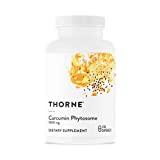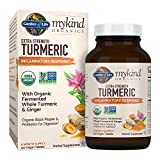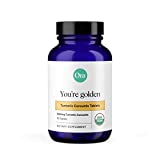Turmeric for PCOS
Polycystic Ovary Syndrome (PCOS) is a hormonal disorder affecting women of reproductive age, characterized by hormonal imbalances, irregular periods, insulin resistance, and increased androgen production. It may also result in the development of ovarian cysts. Factors such as genetics, insulin resistance, and inflammation contribute to PCOS.
Common symptoms include irregular menstrual cycles, hirsutism, acne, weight gain, hair thinning or loss, infertility, and skin darkening. Diet plays a crucial role in managing PCOS symptoms. A well-balanced diet helps regulate hormones, improve insulin sensitivity, and promote weight loss, which can alleviate some symptoms. Turmeric, particularly its active compound curcumin, may offer potential benefits for individuals with Polycystic Ovary Syndrome (PCOS).
In this article, we will explore the advantages of turmeric, potential adverse effects, ways to incorporate it into your daily meals, and the top turmeric products for supporting PCOS management.
What is Turmeric?

Turmeric is a yellow-orange spice that comes from the root of the Curcuma longa plant, which is native to Southeast Asia, particularly India. It has been used for thousands of years in traditional medicine, cooking, and as a natural dye. Turmeric is a key ingredient in many Asian and Middle Eastern dishes, especially curry, and is responsible for the characteristic yellow color and earthy, slightly bitter flavor.
The primary active compound in turmeric is curcumin, which has gained significant attention for its numerous potential health benefits. Several benefits have been observed in various studies. Here are some potential benefits of curcumin:
Anti-inflammatory properties: Curcumin has been shown to have potent anti-inflammatory effects, which may help in managing conditions like arthritis, inflammatory bowel disease, and other inflammatory-related disorders.
Antioxidant properties: Curcumin is a powerful antioxidant that can help neutralize free radicals, which are molecules that can cause oxidative stress and contribute to aging and various diseases.
Potential cancer-fighting properties: Some research suggests that curcumin may have anticancer properties by inhibiting the growth of cancer cells, reducing the spread of tumors, and promoting cancer cell death. However, more research is needed to establish its effectiveness in cancer treatment.
Improving brain function: Curcumin has been studied for its potential to improve brain function by increasing brain-derived neurotrophic factor (BDNF), a protein involved in the growth and maintenance of nerve cells. This may help protect against age-related cognitive decline and neurodegenerative diseases like Alzheimer’s disease.
Heart health: Curcumin may help improve heart health by reducing inflammation, oxidative stress, and improving endothelial function, which is essential for proper blood vessel function.
Managing diabetes and insulin resistance: Some studies suggest that curcumin may help improve insulin sensitivity and reduce blood sugar levels, making it potentially beneficial for managing diabetes and insulin resistance.
Reducing depression symptoms: Curcumin may have potential antidepressant properties by modulating neurotransmitters like serotonin and dopamine. Some studies have shown that it could help alleviate symptoms of depression, but more research is needed in this area.
Supporting liver health: Curcumin has been shown to help protect the liver from damage by reducing inflammation, oxidative stress, and improving liver function.
Antiviral, antibacterial, and antifungal properties: Curcumin has demonstrated potential antiviral, antibacterial, and antifungal properties, which may be beneficial in fighting infections and supporting the immune system.
Pain relief: Some research suggests that curcumin may help reduce pain and inflammation, making it a potential alternative to conventional pain relievers in certain cases.
Although turmeric is generally considered safe when consumed as a spice in food, concentrated curcumin supplements may have side effects and interact with certain medications. Therefore, it’s important to consult a healthcare professional before adding turmeric or curcumin supplements to your diet, particularly if you have any existing health conditions or are taking medications.
Benefits of turmeric for PCOS include:
Anti-inflammatory effects: PCOS is often linked to chronic low-grade inflammation, which can contribute to insulin resistance and hormonal imbalances. Curcumin in turmeric has strong anti-inflammatory properties that may help reduce inflammation in women with PCOS.
Antioxidant properties: Oxidative stress is thought to play a role in the development and progression of PCOS. Curcumin has potent antioxidant properties, which can help combat oxidative stress and improve overall health.
Improving insulin sensitivity: Insulin resistance is a common characteristic of PCOS and can lead to type 2 diabetes and other health issues. Some studies suggest that curcumin may help improve insulin sensitivity and reduce the risk of developing diabetes in women with PCOS.
Regulating hormone levels: Some studies indicate that curcumin may help regulate hormone levels in women with PCOS, particularly by decreasing luteinizing hormone (LH) levels and increasing follicle-stimulating hormone (FSH) levels. This may help improve menstrual regularity and fertility.
Reducing symptoms: There is some evidence that curcumin may help alleviate the severity of certain PCOS symptoms, such as acne and hirsutism (excessive hair growth).
Enhancing Curcumin’s Bioavailability and Its Impact on Nutrient Absorption
Curcumin, the primary active compound in turmeric, has a notably low bioavailability, which means it is not easily absorbed into the bloodstream. This can make it challenging to achieve the full range of potential health benefits associated with curcumin. Fortunately, there are several natural methods to boost its bioavailability and maximize its effects.
One effective approach is to consume turmeric alongside black pepper, which contains a compound called piperine. Research suggests that piperine can enhance curcumin absorption by up to 2000%, making it a powerful enhancer of curcumin’s bioavailability.
It’s important to be aware that turmeric can also act as an antinutrient, potentially interfering with the absorption of iron in the body. Studies have shown that turmeric could reduce iron bioavailability by 20-90%. This interaction should be taken into consideration, particularly for individuals who already have low iron levels or are at risk for iron deficiency. To minimize this effect, it may be helpful to consume iron-rich foods and turmeric-containing meals at separate times.
Potential Side Effects and Precautions for Turmeric Consumption
While turmeric is generally regarded as safe for most people, there are some rare instances where this spice may lead to adverse effects. It is crucial to be aware that turmeric’s potent properties could interact with certain medications, such as blood thinners or diabetes medications.
Some individuals may also experience allergic reactions or digestive issues, particularly when taking large doses of turmeric. If you notice any adverse effects after consuming turmeric, it is essential to consult your healthcare provider to discuss your symptoms and determine the appropriate course of action. Moderation and proper guidance from a healthcare professional are key to ensuring that you can safely enjoy the potential benefits of turmeric.
Incorporating Turmeric into Your Diet Without the Taste

If you don’t enjoy the taste of turmeric but still want to benefit from its potential health properties, there are several ways to incorporate it into your diet without compromising the flavor of your meals:
Turmeric capsules: If you prefer not to taste turmeric at all, you can take turmeric or curcumin supplements in capsule form. Consult with a healthcare professional to determine the appropriate dosage and ensure that it does not interact with any existing medications or health conditions.
Mix with other spices: Combine turmeric with other strong-tasting spices, such as cumin, coriander, and paprika, to create a flavorful blend that can mask the taste of turmeric.
Add to smoothies: Adding a small amount of turmeric to fruit or vegetable smoothies can help disguise its taste. Ingredients like bananas, mangoes, spinach, or berries can help mask the flavor while providing additional nutrients.
Use in soups and stews: Incorporate a small amount of turmeric into soups or stews, as the flavors of other ingredients, especially those with strong, robust flavors, can help diminish the taste of turmeric.
Incorporate into salad dressings: Create a homemade salad dressing by combining turmeric with other ingredients like olive oil, lemon juice, vinegar, and honey. The mixture of flavors can help conceal the taste of turmeric.
Bake with turmeric: Add a small amount of turmeric to baked goods, such as muffins, cookies, or bread. The sweetness and flavors of the baked goods can help mask the taste of turmeric.
Remember to start with small amounts of turmeric and gradually increase the quantity to find the right balance for your taste preferences. Experiment with different recipes and combinations to discover enjoyable ways to incorporate turmeric into your diet without the taste being overwhelming.
The Best Turmeric Supplements for PCOS: High Quality, Optimal Absorption, and Third Party Tested



Conclusion: Is Turmeric Good for PCOS?
In conclusion, turmeric, particularly its active compound curcumin, offers many benefits for individuals with Polycystic Ovary Syndrome (PCOS). Its anti-inflammatory, antioxidant, and hormone-regulating properties, along with its potential to improve insulin sensitivity, could help alleviate some of the symptoms and underlying factors associated with the condition.
However, it’s essential to remember that turmeric alone is not a solution for PCOS. A balanced diet and a healthy lifestyle play a critical role in managing PCOS and its symptoms. Consuming a diet rich in whole, unprocessed foods, such as fruits, vegetables, whole grains, lean proteins, and healthy fats, can help regulate hormone levels and improve insulin sensitivity. Additionally, limiting the intake of refined carbohydrates, sugary foods, and high glycemic index foods can further support blood sugar regulation and overall health.
Incorporating turmeric into a balanced diet and adopting healthy habits, such as regular exercise, stress management, and adequate sleep, can contribute to a comprehensive approach to managing PCOS. It is crucial to work closely with a healthcare professional to develop an individualized treatment plan tailored to your specific needs.






